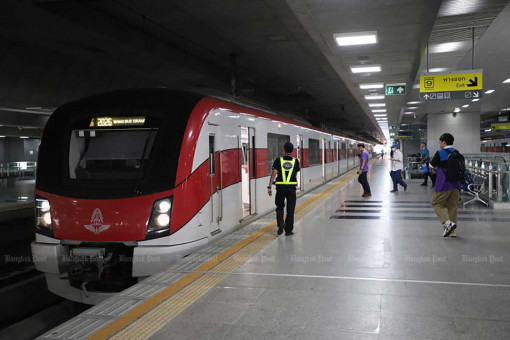B29.7bn to help link northern provinces
PUBLISHED : 26 Sep 2023 at 04:24

The State Railway of Thailand (SRT) is to ask the cabinet to approve more than 50 billion baht to finance the building of the double-track railway section from Khon Kaen to Nong Khai and Red Line electric train extensions.
The move comes after Transport Minister Suriya Jungrungreangkit issued a directive to accelerate key railway projects and submit the proposals to the cabinet this month, SRT governor Nirut Maneephan said on Monday.
Mr Nirut said the money would finance Phase II of the double-track rail route linking Khon Kaen to Nong Khai, covering a distance of 167 km, with a combined budget of 29.7 billion baht.
Of that, 9 million baht is earmarked for hiring a real estate consultant, 369 million baht is for land ownership management, 7 million baht is for bidding, 28.7 billion baht will be for construction and 604 million baht for hiring a firm to supervise the construction work.
The SRT also plans to launch bidding to seek a private partner for the construction of the Natha transhipment cargo centre linking the Laos and China rail route in Nong Khai, Mr Nirut said.
As well as the double-track rail project, the SRT plans to build three Red Line electric train route extensions with a combined budget of 21.7 billion baht, Mr Nirut said.
The 14.8-km Taling Chan-Salaya section requires a budget of 10.6 billion baht to build. The cost includes railway construction (8.07 billion baht), power system and machine installation (2.28 billion baht), and the rest is for hiring consultants.
The 5.7-km Taling Chan-Siriraj section will utilise a budget of 4.61 billion baht. The cost includes railway construction (2.79 billion baht), power system and machine installation (1.67 billion baht), and the rest is for consultants.
The 8.84-km Rangsit-Thammasat University’s Rangsit Campus section requires a budget of 6.46 billion baht. The cost includes railway construction (4.05 billion baht), power system and machine installation (2 billion baht) and consultant fees.
Regarding the procurement of 184 air-conditioned diesel trains, Mr Nirut said the SRT is in talks with the Office of the National Economics and Social Development Council to work out the feasibility of the project.
“A feasibility study suggested the procurement plan may not be worth [the money]. If it is not, then it should not be invested,” he said.
“In the future, most countries in Europe will use hybrid or electric trains.”

